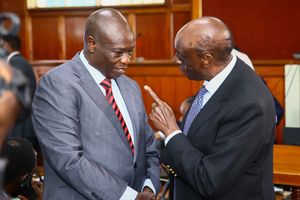Judiciary has role to play in DP ouster bid

The Judiciary is constitutionally empowered to hear Gachagua impeachment.
It must have begun as whispers in the corridors of political power. At least for the majority of the public, it registered when it morphed into open noise being shouted on the political streets. The mutation acquired new seriousness when the shouts made their way into Parliament, an arena for the actualisation of the content of noise. At this point though, the drama would have a sub-plot. As the process played out in Parliament, simultaneous effort was made to involve the Judiciary.
Last week easily qualifies as the most intense for the impeachment process of Rigathi Gachagua. The decision not to precede his name with the designation ‘Deputy President’ is deliberate. It is the subject of ongoing confusion and division. Some argue that he remains the Deputy President; while others argue that he is no longer the current but the former DP.
Within Parliament, the impeachment process was proceeding according to the rules. Having cleared with the National Assembly earlier, it was the Senate’s turn last week, sitting as a quasi-judicial institution, to process the case. A strange twist ensued though when on Thursday afternoon, the DP failed to appear before the Senate for cross-examination.
It would later be confirmed that he had been taken ill and checked in at the hospital. Senate decided to proceed with dispensing the matter and late that night, the Deputy President was impeached. The name of his replacement, Prof Kithure Kindiki, was relayed to the National Assembly on Friday and overwhelmingly voted for.
But even as this was happening, anyone patrolling the online streets, especially the X (formerly Twitter) streets, must have noticed a separate plot playing out. It was just as noisy, if not more, with commentators, especially lawyers, viciously, and occasionally acrimoniously, defending their respective positions. Rarely does an issue trigger intense division as the impeachment of the Deputy President has. A number of issues has divided the legal profession right in the middle.
The role of the Judiciary comes out as the most divisive. Opponents argue that this being a political process, the Judiciary must not assume any role. They have even evoked the ‘political doctrine’ question as a justification for their position. They argue, rather persuasively, that the Judiciary’s involvement would occasion the undesired impact of weakening impeachment as Parliament’s tool to check the Executive. On their side, proponents strongly argue that the Judiciary is constitutionally empowered to hear the matter.
Legal arguments notwithstanding, the Judiciary is seized of the matter. Separate rulings by the High Court froze the planned swearing-in of Prof Kindiki. I suggest that there is a strong case to be made for the Judiciary’s involvement.
It is to be noted that impeachment carries with it existential consequences. Anyone impeached is permanently barred from holding public office. It is not in doubt that impeachment is a political process. There is a strong case to be made that subjecting the process to the Judiciary ensures fairness. Allegations would have a fair platform to be thoroughly examined and definitively decided either way, without the overriding influence of partial political considerations.
Mr Ogutu is a political commentator. [email protected]





